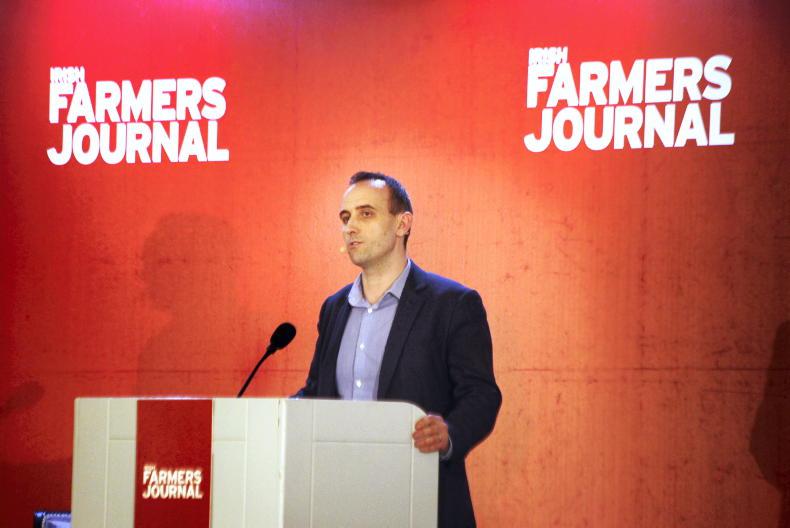The announcement of agriculture’s 2030 decarbonisation target reveals the sharp edge of climate policy for farmers.
Despite some relief that agriculture’s 21-30% emissions reduction requirement is lower than other sectors, the challenge is formidable.
New research by KPMG for the Irish Farmers Journal reveals the high economic stakes for farming and the rural economy. It shows contrasting pathways determined by the agriculture decarbonisation target and the sector’s success in harnessing farm management actions to reduce emissions. By implication, a shortfall in the industry’s ability to meet its target through abatement measures could lead to the imposition of more costly reductions in livestock numbers.
With plausible uptake assumptions for the Teagasc MACC measures, the research shows that a 13% reduction in agricultural emissions would be achievable
The KPMG analysis indicates that targeted reductions consistent with the sector’s capacity to mitigate emissions from available measures in the Teagasc MACC are cost-effective due to the enhanced technical and financial efficiencies associated with key abatement options. But what target is realistic for agriculture under the assumption of a stable national herd? With plausible uptake assumptions for the Teagasc MACC measures, the research shows that a 13% reduction in agricultural emissions would be achievable, rising to 18% with higher uptake and the addition of new technologies such as feed additives to reduce methane. Nevertheless, a gap remains between the reductions attainable through MACC measures and the binding 21-30% target.
Reorientation of mindsets
Achieving cost-effective MACC implementation will require a whole-scale reorientation of mindsets with concerted and coordinated efforts at all levels. Behaviour changes depend on complex human characteristics, and overall success depends on the management decisions of thousands of individual farmers.
Many farmers are already implementing recommended changes, but others will struggle with the size and speed of necessary adjustments in farm management. The role of knowledge transfer and advisory services alongside complementary supports through the supply chain will be critical.
We must also overcome a collective action problem since adjustments are often perceived to be the responsibility of others rather than ourselves
Similarly, at the policy level, the enhanced budget provision through the carbon tax for targeted environmental and climate programmes will demonstrate the Government’s commitment to supporting the sector in the vital adaptations needed. We must also overcome a collective action problem since adjustments are often perceived to be the responsibility of others rather than ourselves. Addressing this challenge will require carbon budgeting and targets to be internalised at the individual farm level.
Their analysis suggests that a 30% emissions reduction, even with MACC measures, could require a reduction in the national bovine herd of around 20%
The alternative to mitigation through better management is much worse. A failure to deliver through MAAC measures will almost certainly lead to divisive calls for herd reductions. The KPMG analysis demonstrates the severe damage such a scenario would inflict on farm incomes and the broader rural economy. Their analysis suggests that a 30% emissions reduction, even with MACC measures, could require a reduction in the national bovine herd of around 20%. This scenario could reduce the average incomes of dairy and beef farms by €17,500 (25%) and €3,300 (36%), respectively.
The overall loss to output in the economy, accounting for these multiplier effects, is likely to be almost double the direct reduction in farm output
The report also reveals the knock-on impacts of herd reductions on the input supply and processing businesses that depend on farming, magnifying the output and employment implications in the economy. The overall loss to output in the economy, accounting for these multiplier effects, is likely to be almost double the direct reduction in farm output. The KPMG analysis suggests that each 1% reduction in either the dairy or the beef herd would result in similar costs for the economy of c.€100m in lost output.
Imperatives
The imperatives for Irish agriculture in meeting its binding climate commitments are clear. The sector must mobilise itself for an unprecedented effort to decarbonise, harnessing the spectrum of mitigation measures on farms while stabilising the national herd.
The challenge is enormous, but failure to act will expose the industry to future curbs on livestock numbers that would be much more damaging for farming and the broader rural economy.

Prof Michael Wallace. \ Dave Ruffles
The announcement of agriculture’s 2030 decarbonisation target reveals the sharp edge of climate policy for farmers.
Despite some relief that agriculture’s 21-30% emissions reduction requirement is lower than other sectors, the challenge is formidable.
New research by KPMG for the Irish Farmers Journal reveals the high economic stakes for farming and the rural economy. It shows contrasting pathways determined by the agriculture decarbonisation target and the sector’s success in harnessing farm management actions to reduce emissions. By implication, a shortfall in the industry’s ability to meet its target through abatement measures could lead to the imposition of more costly reductions in livestock numbers.
With plausible uptake assumptions for the Teagasc MACC measures, the research shows that a 13% reduction in agricultural emissions would be achievable
The KPMG analysis indicates that targeted reductions consistent with the sector’s capacity to mitigate emissions from available measures in the Teagasc MACC are cost-effective due to the enhanced technical and financial efficiencies associated with key abatement options. But what target is realistic for agriculture under the assumption of a stable national herd? With plausible uptake assumptions for the Teagasc MACC measures, the research shows that a 13% reduction in agricultural emissions would be achievable, rising to 18% with higher uptake and the addition of new technologies such as feed additives to reduce methane. Nevertheless, a gap remains between the reductions attainable through MACC measures and the binding 21-30% target.
Reorientation of mindsets
Achieving cost-effective MACC implementation will require a whole-scale reorientation of mindsets with concerted and coordinated efforts at all levels. Behaviour changes depend on complex human characteristics, and overall success depends on the management decisions of thousands of individual farmers.
Many farmers are already implementing recommended changes, but others will struggle with the size and speed of necessary adjustments in farm management. The role of knowledge transfer and advisory services alongside complementary supports through the supply chain will be critical.
We must also overcome a collective action problem since adjustments are often perceived to be the responsibility of others rather than ourselves
Similarly, at the policy level, the enhanced budget provision through the carbon tax for targeted environmental and climate programmes will demonstrate the Government’s commitment to supporting the sector in the vital adaptations needed. We must also overcome a collective action problem since adjustments are often perceived to be the responsibility of others rather than ourselves. Addressing this challenge will require carbon budgeting and targets to be internalised at the individual farm level.
Their analysis suggests that a 30% emissions reduction, even with MACC measures, could require a reduction in the national bovine herd of around 20%
The alternative to mitigation through better management is much worse. A failure to deliver through MAAC measures will almost certainly lead to divisive calls for herd reductions. The KPMG analysis demonstrates the severe damage such a scenario would inflict on farm incomes and the broader rural economy. Their analysis suggests that a 30% emissions reduction, even with MACC measures, could require a reduction in the national bovine herd of around 20%. This scenario could reduce the average incomes of dairy and beef farms by €17,500 (25%) and €3,300 (36%), respectively.
The overall loss to output in the economy, accounting for these multiplier effects, is likely to be almost double the direct reduction in farm output
The report also reveals the knock-on impacts of herd reductions on the input supply and processing businesses that depend on farming, magnifying the output and employment implications in the economy. The overall loss to output in the economy, accounting for these multiplier effects, is likely to be almost double the direct reduction in farm output. The KPMG analysis suggests that each 1% reduction in either the dairy or the beef herd would result in similar costs for the economy of c.€100m in lost output.
Imperatives
The imperatives for Irish agriculture in meeting its binding climate commitments are clear. The sector must mobilise itself for an unprecedented effort to decarbonise, harnessing the spectrum of mitigation measures on farms while stabilising the national herd.
The challenge is enormous, but failure to act will expose the industry to future curbs on livestock numbers that would be much more damaging for farming and the broader rural economy.

Prof Michael Wallace. \ Dave Ruffles











SHARING OPTIONS